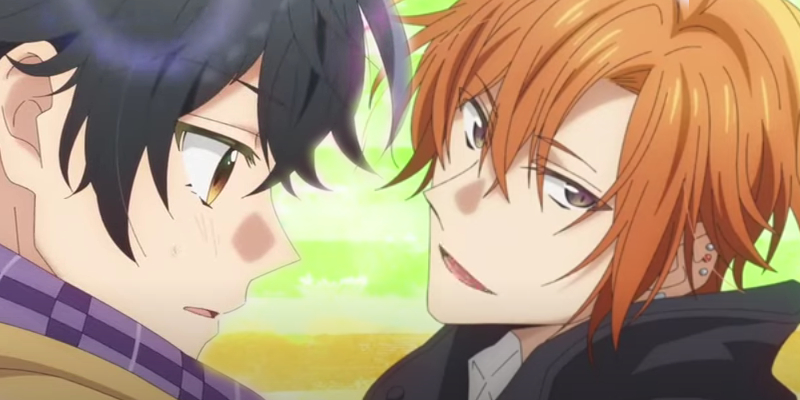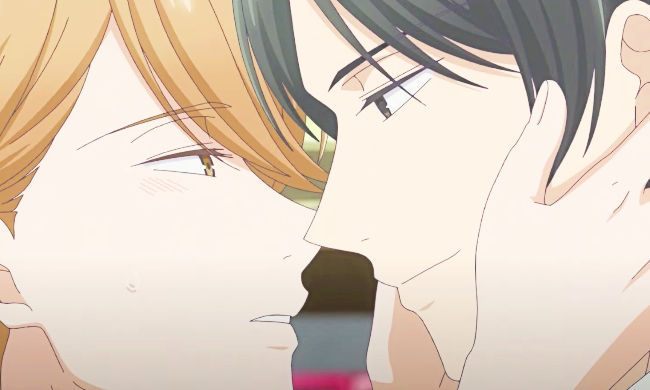Tadaima, Okaeri is a fresh addition to the boy’s love (BL) anime genre, and it’s been winning people over fast. New episodes are currently dropping every Monday on Crunchyroll, and fans are obsessed with the quiet, domestic intimacy of this little family. It’s soft, but it also hits hard when it wants to.
Part of what makes Tadaima, Okaeri so different is the blend of genres. It’s BL/yaoi. It’s slice of life. And it’s also Omegaverse — which is a huge deal, because while Omegaverse has been popular in manga and fanfiction for a long time, this is one of the first times we’re seeing it adapted in this kind of wholesome, day-to-day, family-driven anime format. That alone makes it tricky to find “the exact same thing” to watch next.
So here’s what we’re going to do instead: we’re going to build you a comfort-watch list. Below are BL and boy’s love–adjacent anime and films that carry similar emotional energy: slow-burn romance, domestic vibes, identity, found family, queer adults navigating life, and soft moments that feel like home. No, they’re not all Omegaverse — that’s still new territory for anime — but they are titles that fans of Tadaima, Okaeri tend to fall for next.
Slice-of-Life BL Anime for Tadaima, Okaeri Fans
Let’s be really honest here: you’re not going to find a perfect clone of Tadaima, Okaeri. Omegaverse is still brand new in terms of anime adaptations, and the “loving queer parents building a home together with a child” angle is still rare in mainstream BL animation.
BUT — you can absolutely find boy’s love / yaoi anime that give you those same feelings: warmth, belonging, emotional safety, slow intimacy, and the little moments of everyday life that matter more than any dramatic confession. These next titles are the best starting point.

Super Lovers
Super Lovers is probably one of the most controversial BL anime out there, and we’re not going to pretend otherwise. You’ll see it recommended a lot to people who liked Tadaima, Okaeri because it blends slice of life, queer romance, and nontraditional family structure. But it also has relationship dynamics that a lot of viewers find uncomfortable, and that’s important to say up front.
The story begins when Haru goes to visit his mother and meets Ren, a quiet, feral, emotionally closed-off boy who’s been taken in by the family. Haru basically gets told, “Please civilize this child.” So he starts caring for Ren — feeding him, teaching him basic routines, trying to help him feel safe. Over time, that bond becomes incredibly strong. It’s protective, parental in moments, and loyal in a way that feels almost unbreakable.
Later, Ren comes to live with Haru and Haru’s brothers in Japan. This is where things get more complicated. Ren is older by this point, and the relationship starts shifting from “you’re my responsibility” to “you’re my person.” That transition — from family-style caretaking into romantic tension — is exactly why the show is so controversial. There’s an age gap, they’re considered “family,” and some viewers shut it off immediately because that’s a hard no for them. That’s valid.
But in terms of vibes, here’s why it lands on lists next to Tadaima, Okaeri:
- It’s about building a home together and figuring out where you belong.
- It’s about a complicated, not-always-healthy version of “I will take care of you because no one else does.”
- It focuses just as much on day-to-day living as it does on romance.
If you’re drawn to the “family first / us against the world” energy in Tadaima, Okaeri, Super Lovers gives you that — just in a much messier, more morally gray way. Watch with an open mind and know what you’re walking into.
You can watch Super Lovers on Crunchyroll.
Sasaki and Miyano
Sasaki and Miyano is one of the newer additions to BL anime, and it stole a lot of hearts fast. If Tadaima, Okaeri hooked you because it’s soft and low-conflict and emotionally honest, this one should absolutely be next on your list.
Miyano is a shy, polite, slightly anxious boy who secretly reads BL manga. He doesn’t want people to know that, because he’s embarrassed and also because he isn’t really sure how to talk about his own identity yet. One day he meets Sasaki — the older, slightly delinquent, “I-don’t-care-what-anyone-thinks” type. Sasaki finds out about Miyano’s BL hobby and instead of making fun of him… he leans in. He asks questions. He wants to know more. He borrows the manga. He starts hanging around more and more.
This is where it gets really sweet. Sasaki slowly realizes that it’s not just the manga he’s interested in. It’s Miyano. He likes Miyano. Like, likes likes him. But instead of pushing or getting aggressive or forcing a kiss (which happens in a lot of older yaoi, let’s be honest), he actually gives Miyano room to figure himself out. He’s patient. He waits. He respects boundaries.
The show is almost painfully wholesome. It leans into awkward flirting, soft blushing, accidental hand brushes, and, “Oh no I walked you home again, oops, how did that keep happening?” If your favorite thing about Tadaima, Okaeri is watching two people just genuinely love each other and build a safe emotional space, Sasaki and Miyano hits that exact nerve — just in a high school setting instead of a domestic/family setting.
Bonus detail: This show is also kind of meta. It’s a BL story about boys who read BL, and it plays gently with that idea of “do I like this because it’s cute, or do I like this because it’s me?” It’s funny, self-aware, and comforting in a way a lot of BL just isn’t allowed to be.
Sasaki and Miyano is available to stream on Crunchyroll.

The Stranger by the Shore
The Stranger by the Shore (also called Stranger by the Shore / Umibe no Étranger) is technically an anime film instead of a full series — but don’t skip it. If you loved Tadaima, Okaeri for its warmth and its focus on adult queer life instead of just teen crushes, this should probably be at the top of your list.
The story follows Shun, an aspiring novelist who’s openly gay and trying to live honestly, even though that honesty got him disowned by his family and cut off from the future everyone else picked for him. Then there’s Mio, a quiet boy dealing with deep grief after losing his mother. They meet in a small seaside town and form this gentle, aching connection.
Then Mio leaves. Years go by. And when he comes back, he basically shows up like, “I’m here. I came back for you. Do you still want me?”
From there, it’s not about “are we attracted to each other?” (we’re way past that). It’s about: Can we actually build a life together? Can we choose each other openly? Can I let myself be loved even if I’ve spent years convinced I don’t deserve softness?
Visually, this movie is gorgeous — beaches, twilight colors, slow quiet shots. Emotionally, it’s even better. If you’re craving queer love between adults that isn’t played as a joke or a scandal, this is exactly that. It’s vulnerable. It’s respectful. It’s intimate without being cruel. And it absolutely shares DNA with Tadaima, Okaeri in the way it treats home, safety, and chosen family.
You can stream The Stranger by the Shore on Crunchyroll.
Antidote (Jie Yao)
Antidote (also known as Jie Yao) is a really interesting pick because it’s not a high school romance. So if you’re kind of over “school hallway flirting,” and you want something rougher, older, and more grounded, this one will stand out for you.
The story follows Cheng Ke, who comes from a wealthy background but basically walks out on that entire life. He’s done. He doesn’t want money to define him, he doesn’t want expectations put on him, and he definitely doesn’t want to be controlled. He ends up renting a rundown place and trying to start over with nothing.
Enter Jiang Yuduo — local gang boss, absolutely not the type of guy Cheng Ke thought he’d ever have to deal with, and (plot twist) also his new landlord. These two could not be more different on paper. But of course, they collide instead of staying separate. What starts as tension and annoyance slowly becomes protection and attachment. They start watching out for each other. They start depending on each other. And they start letting old wounds show.
That combination — mutual survival, emotional unlearning, and “I’ll keep you safe because I said so” energy — is exactly why a lot of BL fans love Antidote. It’s a story about two people trying to figure out how to exist in a world that hasn’t exactly been kind to either of them. No magic. No fantasy. Just trauma, healing, and this messy, protective bond that turns into something like love.
The downside? Antidote can be tough to find in good quality, depending on region and platform. It’s worth hunting down if you like grittier BL with found-family undertones, but it’s not always as easy to stream as some of the others on this list.
World’s Greatest First Love (Sekaiichi Hatsukoi)
Sekaiichi Hatsukoi (also known as World’s Greatest First Love) is for anyone who loved the mature domesticity in Tadaima, Okaeri — the sense that love isn’t just flirting, it’s daily life and emotional history and trying to choose each other on purpose.
Instead of high schoolers, we’re following adults working in the manga publishing world. Ritsu Onodera is desperate to be taken seriously for his talent instead of his family name, so he leaves his father’s company and takes a job at Marukawa Publishing. He expects something classy and literary. What he gets is… shoujo manga. Deadlines. Chaos. Artists who are constantly behind. Editors who haven’t slept in three days.
And then there’s his new boss, Masamune Takano — who turns out to be his first love from years ago.
So now Ritsu is stuck working with (and under) the man who broke his heart, while trying very, very hard not to fall for him all over again. Meanwhile, Takano is basically like, “I’m not letting you run from this again. You loved me then. You still do. I’m not wrong.” So tension? Yes. Denial? Absolutely. Feelings? Everywhere.
Here’s why this show lines up emotionally with Tadaima, Okaeri:
- It’s about adults trying to build an actual life, not just confess their crush.
- It treats queer relationships as real relationships — complicated, messy, rooted in history.
- It shows how choosing love isn’t always soft. Sometimes it’s work. Sometimes it’s vulnerable in ways that are honestly scary.
If you wanted something with older characters, career stress, and love that already has roots instead of starting from zero, Sekaiichi Hatsukoi is perfect.
You can stream Sekaiichi Hatsukoi on Crunchyroll.
Gravitation
Gravitation is basically BL history. Is it cheesy? Yes. Is it dramatic? Yes. Is it dated? Very. But it’s also a huge part of why BL as an anime genre exists in the first place, and if you’re new to BL because Tadaima, Okaeri was your starting point, it’s kind of fun (and chaotic) to go back and see where a lot of these tropes came from.
The story follows Shuichi Shindo, a passionate, loud, slightly disaster-prone singer who’s trying to make it big with his band. He crosses paths with Eiri Yuki, a successful novelist who is cold, blunt, and emotionally walled off. Yuki reads Shuichi’s lyrics and basically says, “This is embarrassing. You have no talent.” Which, obviously, does not go over well.
Instead of being crushed, Shuichi fixates. He wants to prove himself, yes — but he’s also just instantly drawn to Yuki in a way he doesn’t totally understand. That spark becomes obsession, which becomes attraction, which becomes full-blown messy romance. Yuki, for his part, is constantly battling his own trauma and internalized shame about loving another man. So it’s not smooth. It’s not quiet. But it’s raw in a very 90s/early 2000s way.
Is Gravitation as gentle as something like Tadaima, Okaeri? No, not at all. But it is honest about queer longing and the hunger to be seen, and it lays groundwork for a lot of what modern BL is allowed to do now — healthier dynamics, softer love, more open queerness. Basically, if you’re doing a BL deep dive, this is a “know your roots” watch.
You can stream Gravitation on Crunchyroll.
Cherry Magic! Thirty Years of Virginity Can Make You a Wizard?!
Cherry Magic! Thirty Years of Virginity Can Make You a Wizard?! has a ridiculous title and a surprisingly tender heart. If you’re specifically craving sweet queer romance between grown adults living regular working lives — no high school, no fantasy kingdoms, just “two office guys trying not to combust” — this one delivers.
Here’s the setup: in this world, if you make it to age 30 without any sexual experience, you unlock magic. (Yes, really.) Our main character, Adachi, turns 30, unlocks his “bonus skill,” and discovers his specific power is mind-reading through physical contact.
This would already be horrible for an anxious, self-conscious introvert… but then he accidentally brushes against Kurosawa, his attractive, hyper-competent coworker. And immediately hears, in full detail, that Kurosawa is wildly in love with him. Like, respectfully in love. Romantically in love. “You’re perfect and I would carry you around like a princess” in love.
From that moment on, Adachi’s entire world kind of melts down in slow motion.
What makes Cherry Magic so lovable is how gentle it is. Kurosawa never tries to corner Adachi or overwhelm him. He’s careful with him. He’s patient. He checks in constantly, emotionally, without even knowing Adachi can hear his thoughts. And Adachi, who has spent his whole life convinced he’s unremarkable and hard to love, has to face this huge, terrifying question: “What if someone actually wants me? Like, really wants me?”
In terms of vibe, Cherry Magic is probably the closest on this list to the emotional safety of Tadaima, Okaeri. There’s no humiliation. No shock drama. No “gotcha.” Just slow trust, kind affection, and two adults navigating real vulnerability. The fantasy element (the “wizard” part) is basically just a story tool to force honesty and intimacy in a way that’s adorably awkward instead of cruel.
So… Is There Anything Exactly Like Tadaima, Okaeri?
Not yet. And that’s actually what makes Tadaima, Okaeri kind of special.
Omegaverse is still new in anime. Seeing queer domestic life handled with softness, respect, and parental tenderness is still new in anime. Seeing two men raise a child together in a way that’s presented as normal and deeply loving is definitely still new in anime.
If you don’t need the Omegaverse angle specifically — and you’re mostly chasing the emotional core of Tadaima, Okaeri — then the titles above will absolutely keep you fed: comfort, safety, queer love with real stakes, and characters who choose each other on purpose.
Which BL or slice-of-life title is your personal comfort watch? And which one should we add next for Tadaima, Okaeri fans? Tell us in the comments — we’re always collecting recs.


Leave a Reply